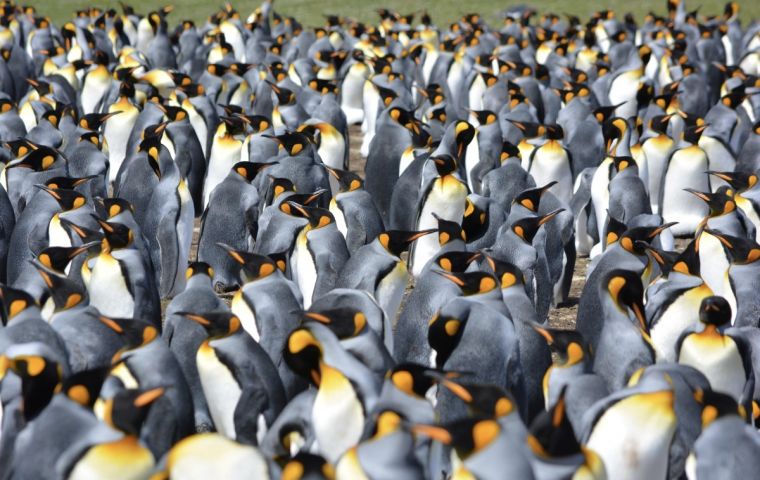MercoPress. South Atlantic News Agency
World's Penguin Day, five of 18 species live in the Falkland Islands
 Magellanic, Rockhopper, Gentoo, King, and Macaroni penguins have rookeries in the Falklands
Magellanic, Rockhopper, Gentoo, King, and Macaroni penguins have rookeries in the Falklands April 25, marks World Penguin Day, an opportunity for many wildlife organizations to tout conservation efforts for these charismatic, amphibious birds. It’s nearly winter in the southern hemisphere, and April 25 coincides with Antarctic penguins’ annual northward march to the sea.
Penguins are some of the hardiest and most adaptable birds on the planet. But like all wildlife, they are not impervious to all things. Rising global temperatures, lost or discarded fishing equipment, and ocean pollution pose significant threats to many penguins’ existence.
Experts say that of the 18 penguin species, 5 are endangered — Galapagos, African, northern rockhopper, erect-crested, and yellow-eyed — and another 5 are threatened.
#DidYouKnow the Falkland Islands are home to over a million penguins
— Government House (@GHFalklands) April 25, 2022
Falklands Conservation work hard to protect the Islands' penguin population. This is part of the Islanders' work to preserve their natural heritage.#WorldPenguinDay #LookingForwardat40@FI_Conservation pic.twitter.com/9rswTDA04H
The Falkland Islands has five species — Magellanic, rockhopper, Gentoo, king, and macaroni penguins. The Falklands houses the world’s largest Gentoo population. Their numbers have risen substantially in the last two decades — a trend that’s refreshing.
None of the several species that frequent South Georgia and the South Sandwich Islands are year-round residents. However, some impressively large colonies breed at both spots.
Chinstrap, king, and macaroni penguins gather in dense groups to mate there. Recent estimates indicate that more than a million pairs of macaroni penguins breed on the islands.
According to various studies, penguins are the world’s most popular birds. (Puffins are second on the list. There’s something that draws people to flightless, comical-looking birds.)
Penguins are exceptional divers. They can dive up to 50 meters deep and stay underwater for up to 20 minutes.
Penguins spend one-half to three-quarters of their lives at sea. When seaborn, Magellanic penguins can travel up to 16,000 kilometers searching for food.
Some penguin colonies have returned to the same breeding grounds for thousands of generations — they are absolute creatures of habit.
Parent and chick penguins share unique chirps, which allow them to locate one another among the crowd.
When preparing for a dive, the emperor penguin can accelerate its heart rate to 250 beats per minute, which courses oxygen through its body. Once submerged, it can conserve oxygen by slowing its heart down to 6 beats per minute.
To learn even more about these exceptional birds, check out the below video, courtesy of the Antarctic and Southern Ocean Coalition.





Top Comments
Disclaimer & comment rulesCommenting for this story is now closed.
If you have a Facebook account, become a fan and comment on our Facebook Page!